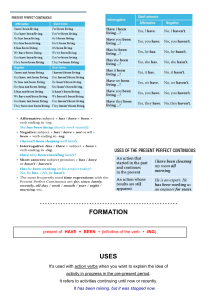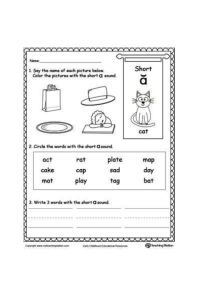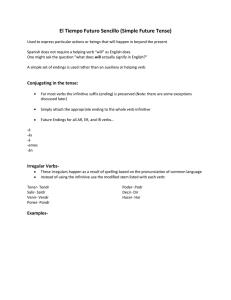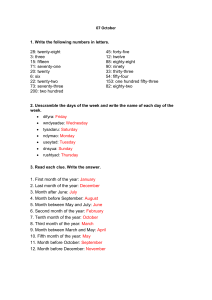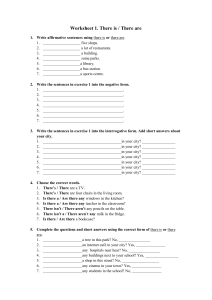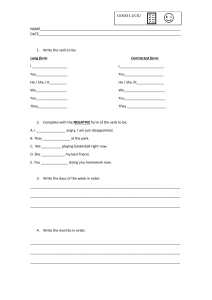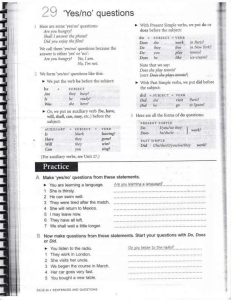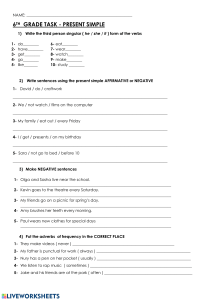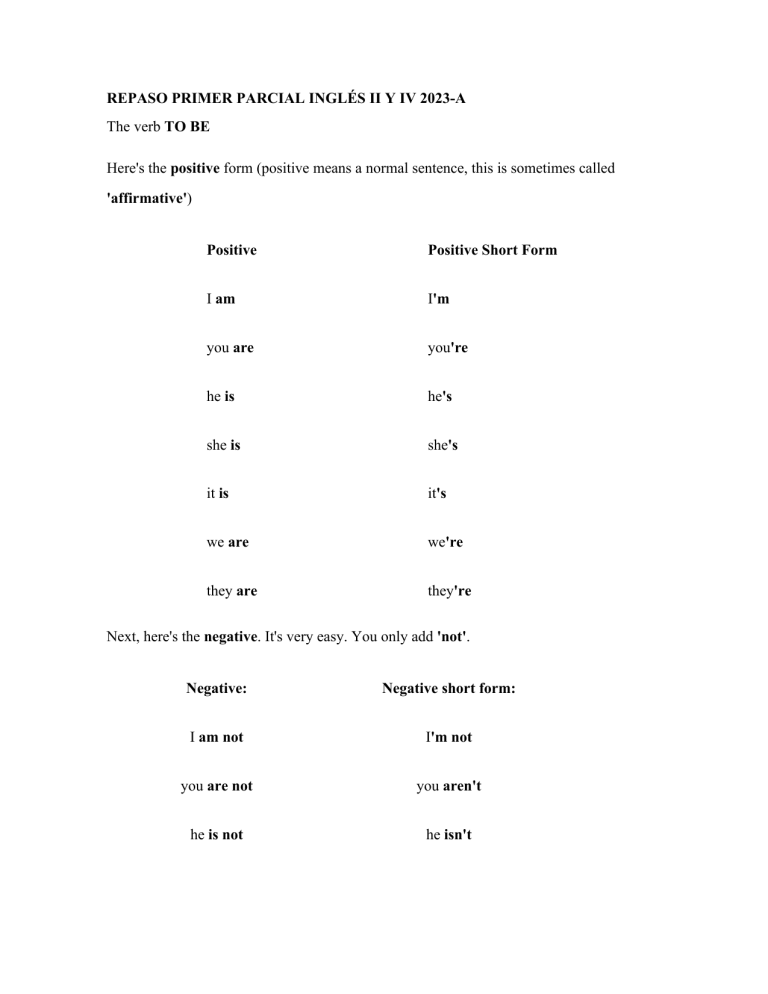
REPASO PRIMER PARCIAL INGLÉS II Y IV 2023-A The verb TO BE Here's the positive form (positive means a normal sentence, this is sometimes called 'affirmative') Positive Positive Short Form I am I'm you are you're he is he's she is she's it is it's we are we're they are they're Next, here's the negative. It's very easy. You only add 'not'. Negative: Negative short form: I am not I'm not you are not you aren't he is not he isn't she is not she isn't it is not it isn't we are not we aren't they are not they aren't And finally let's talk about the question form of the present simple with 'be'. Firstly, here's the 'yes / no' question form: Yes / No Questions am I? is it? are you? are we? is he? are they? is she? If you'd like to make a 'wh' question, you just put the question word at the front: Wh Questions Where What Why Who When How am I ? are you ? is he ? is she ? are we ? are they ? Put in am / is / are. 1. She __________ a teacher. 6. I __________ thirsty. 2. We __________ hungry. 7. It __________ cold. 3. Luke __________ late. 8. She __________ German. 4. They __________ Spanish. 9. He __________ early. 5. You __________ happy. 10. We __________ tired Make the negative with 'be'. 1. I _________ cold. 6. We _____________ late. 2. She _____________ French. 7. It _____________ warm outside. 3. You _____________ an accountant. 8. I _____________ hungry. 4. John _____________ my brother. bus. 9. Ian and Jill _____________ on the 5. They _____________ from Berlin. 10. She _____________ Spanish. Make a question with 'be'. 1. John / in the garden? _______________ 6. She / a teacher? _________________ 2. They / hungry? ___________________ 7. Harry and Lucy / from London? ____ 3. We / late? _______________________ 8. I / early? ______________________ 4. You / tired? ______________________ 9. You / thirsty? __________________ 5. He / French? _____________________ 10. She / on the bus? _______________ Make a question with 'be'. 1. Where / John? __________________ 6. What / this? ____________________ 2. Why / they / hungry? _____________ 7. Where / Jimmy? ________________ 3. Where / we? ____________________ 8. How old / she? _________________ 4. Who / you? _____________________ 9. How / you? ____________________ 5. Why / he / late? _________________ 10. Where / the station? ____________ PRESENT SIMPLE How to make present simple sentences The auxiliar for present simple is: Do/Does Affirmative We use Do with I, You, We, They Subject + verb + comp. We use Does with: He, She, It He speaks English very well Negative Subject + aux. + verb + comp. Aux + subject + verb + comp.+ ? Affirmative sentences in present simple do not use auxiliar, instead, something happens to the verb when we use the 3rd person, the verbs add an ‘S’ at the end Do we speak English very well? He likes pepperoni pizza He does not (doesn´t) speak English very well Interrogative Verbs that add ES at the end are those that end with: Verbs that end with Y preceded by a vowel add S: BUY BUYS SS KISS KISSES PLAY PLAYS SH WASH WASHES OBEY OBEYS CH WATCH WATCHES X FIX FIXES Z BUZZ BUZZES O GO GOES Verbs that end with Y preceded by a consonant change the Y for I and add ES: STUDY STUDIES FLY FLIES Make positive present simple sentences. sentences. Make negative present simple 1. (he / go to school every day) 1. (I / not / like coffee) 2. (I / like swimming) 2. (you / not / enjoy Jazz) 3. (you / play badminton on Saturdays) 3. (she / not / come from Spain) 4. (the class / begin at 9am) 4. (John / not / work in a bank) 5. (they / sometimes go to the cinema) 5. (they / not / get up at eight o'clock) Make present simple questions. Make present simple 'wh' questions 1. (you / like cake?) 1. (where / you / go to school?) 2. (she / live in London?) 2. (what / you / do?) 3. (they / hate studying?) 3. (where / John / come from?) 4. (Samantha / drink tea every morning?) 4. (how long / it / take from London to Paris?) 5. (you smoke?) 5. (how often / she / go to the cinema?) 6. (why / you / eat so much chocolate?) 7 (how / they / get to work?) Frequency adverbs With the present simple, we often use adverbs of frequency to say 'how often' we do something. Here's a list of common adverbs: Always Usually Often Sometimes Hardly ever Never We usually put these adverbs in the middle of the sentence, between the subject and the verb: We usually drink coffee. We put the adverb after a ‘to be’ verb (am, is, are): He is usually at home in the afternoon after school To say how often something happens, you can use a number (If the number is one, use 'once' instead of 'one time'. If the number is two use 'twice' instead of 'two times') Then add 'a' and a period of time: I go to the cinema twice a week. We can also use 'every' + period of time: Every morning Every day Every Tuesday Every week Every month Helen drinks coffee every morning A day of the week with 's' at the end (for example 'on Tuesdays') means the same as 'every Tuesday': I take a dance class on Wednesdays. I relax on Saturdays. Unscramble the words to make present simple sentences with adverbs of frequency 1 often / to the cinema. / (go) / I 2 She / me at home. / sometimes / (visit) 3 (drink) / usually / We / coffee. 4 these tablets / (take) / three times a day. / He 5 Riley (buy) a food every Wednesdays. 6 the dog / on Saturdays. / (relax) The Zero Conditional: (if + present simple, ... present simple) If you heat water to 100 degrees, it boils. Make the zero conditional for the next sentences 1 (my husband / cook / he / burn the food) 2 (Julie / not wear a hat / she / get sunstroke) 3 (you / mix water and electricity / you / get a shock)4 (children / not eat well / they / not be healthy)5 (I / like to visit the museums / I / be in a new city) Simple future positive form (it's just subject + 'will' + infinitive): She will be late negative form (subject + 'will' + not + infinitive - remember will not = won't): It will not snow tomorrow interrogative/ question form a) 'yes / no' questions (will + subject + infinitive + ? Will they leave? b) 'wh' questions (wh question + will + subject + infinitive + ?) What will he cook? The First Conditional: (if + present simple, ... will + infinitive) If it rains tomorrow, we'll go to the cinema.
